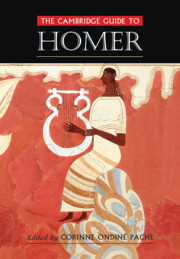Book contents
- The Cambridge Guide to Homer
- The Cambridge Guide to Homer
- Copyright page
- Contents
- Figures
- Notes on the Contributors
- General Introduction
- Part I Homeric Song and Text
- Part II Homeric World
- Part III Homer in the World
- Introduction
- Homer in Antiquity
- Homer and the Latin West in the Middle Ages
- Homer in Greece from the End of Antiquity 1: The Byzantine Reception of Homer and His Export to Other Cultures
- Homer in Greece from the End of Antiquity 2: Homer after Byzantium, from the Early Ottoman Period to the Age of Nationalisms
- Homer in Renaissance Europe (1488‒1649)
- Homer in Early Modern Europe
- The Reception of Homer since 1900
- Introduction by Thomas E. Jenkins
- Homer and War since 1900 by Peter Meineck
- Gendered Reception of Homer by Lillian Doherty
- Homer in Social Thought by Thomas E. Jenkins
- Homer in Greece: The Inevitable and Impossible Nostos by George Syrimis
- Postcolonial Perceptions of Homeric Epic by Emily Greenwood
- Homer and Homerica on Screen by Martin M. Winkler
- From the Cinema to Beyond: Homer in Comics, Television, Apps, and New Media by Thomas E. Jenkins
- Homer in Twentieth (and Twenty-First) Century Scholarship by Alexander Beecroft
- Homer: Image and Cult
- Key Topics
- Bibliography
- Index
- References
Postcolonial Perceptions of Homeric Epic by Emily Greenwood
from The Reception of Homer since 1900
Published online by Cambridge University Press: 22 February 2020
- The Cambridge Guide to Homer
- The Cambridge Guide to Homer
- Copyright page
- Contents
- Figures
- Notes on the Contributors
- General Introduction
- Part I Homeric Song and Text
- Part II Homeric World
- Part III Homer in the World
- Introduction
- Homer in Antiquity
- Homer and the Latin West in the Middle Ages
- Homer in Greece from the End of Antiquity 1: The Byzantine Reception of Homer and His Export to Other Cultures
- Homer in Greece from the End of Antiquity 2: Homer after Byzantium, from the Early Ottoman Period to the Age of Nationalisms
- Homer in Renaissance Europe (1488‒1649)
- Homer in Early Modern Europe
- The Reception of Homer since 1900
- Introduction by Thomas E. Jenkins
- Homer and War since 1900 by Peter Meineck
- Gendered Reception of Homer by Lillian Doherty
- Homer in Social Thought by Thomas E. Jenkins
- Homer in Greece: The Inevitable and Impossible Nostos by George Syrimis
- Postcolonial Perceptions of Homeric Epic by Emily Greenwood
- Homer and Homerica on Screen by Martin M. Winkler
- From the Cinema to Beyond: Homer in Comics, Television, Apps, and New Media by Thomas E. Jenkins
- Homer in Twentieth (and Twenty-First) Century Scholarship by Alexander Beecroft
- Homer: Image and Cult
- Key Topics
- Bibliography
- Index
- References
Summary
This essay analyzes the ambivalence of the reception of the Homeric epics in anti- and postcolonial literatures. The postcolonial reception of the Odyssey can be charted between two poles: the colonizer’s Odyssey, in which works write back to the figure of Odysseus as colonizer, and Odysseus as dispossessed refugee whose wanderings reflect the condition of the wretched of the earth. While the Iliad has been less salient for postcolonial literatures, some notable receptions focus on Helen and on Priam’s back story.
- Type
- Chapter
- Information
- The Cambridge Guide to Homer , pp. 532 - 535Publisher: Cambridge University PressPrint publication year: 2020

